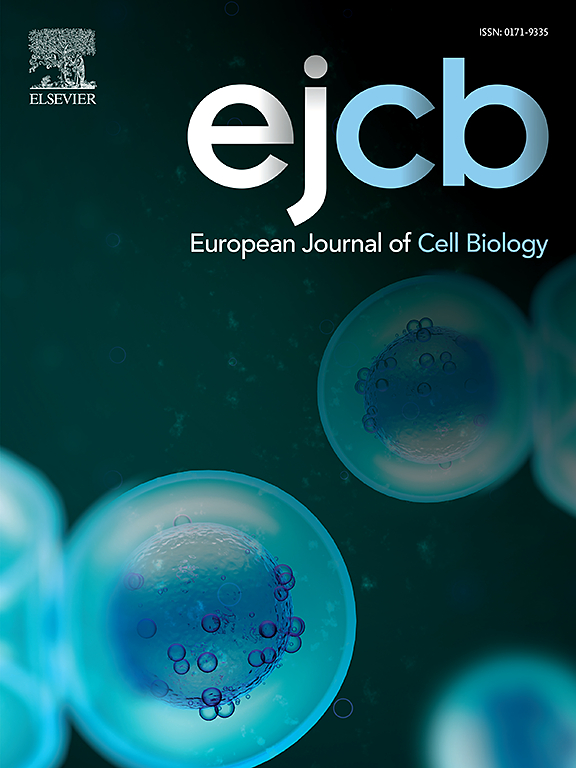Insulin receptor substrate 1 is a novel member of EGFR signaling in pancreatic cells
IF 4.3
3区 生物学
Q2 CELL BIOLOGY
引用次数: 0
Abstract
Pancreatic ductal adenocarcinoma is an extremely incurable cancer type characterized by cells with highly proliferative capacity and resistance against the current therapeutic options. Our study reveals that IRS1 acts as a bridging molecule between EGFR and IGFR/InsR signalization providing a potential mechanism for the interplay between signaling pathways and bypassing EGFR-targeted or IGFR/InsR-targeted therapies. The analysis of IRS1 phosphorylation status in four pancreatic cell lines identified the impact of EGFR signaling on IRS1 activation in comparison with InsR/IGFR signaling. Significantly reduced viability was observed in IRS1-silenced cells even upon EGF stimulation showing the critical role of IRS1 in the EGFR signaling network in both malignant and normal pancreatic cells. This study also demonstrated that EGFR binds directly to IRS1 and at least on two tyrosine sites, Y612 and Y896, IRS1 becomes phosphorylated in response to EGF stimulation. Mechanistically, the EGFR-mediated phosphorylation of IRS1 can further activate the MAPK signaling pathway with the recruitment of GRB2 protein. Collectively, in this study, IRS1 was identified as a crucial regulator in the EGFR signaling suggesting IRS1 as a potential target for more durable responses to targeted PDAC therapy.
胰岛素受体底物 1 是胰腺细胞中表皮生长因子受体信号转导的新成员
胰腺导管腺癌是一种极难治愈的癌症类型,其特点是细胞具有高度增殖能力和对现有治疗方案的抗药性。我们的研究发现,IRS1 是表皮生长因子受体(EGFR)和表皮生长因子受体(IGFR)/表皮生长因子受体(InsR)信号转导之间的桥梁分子,为信号通路之间的相互作用提供了潜在机制,并可绕过 EGFR 靶向疗法或 IGFR/InsR 靶向疗法。通过分析四种胰腺细胞系的IRS1磷酸化状态,确定了与InsR/IGFR信号传导相比,表皮生长因子受体信号传导对IRS1激活的影响。即使在表皮生长因子受刺激的情况下,IRS1沉默细胞的存活率也会显著降低,这表明IRS1在恶性和正常胰腺细胞的表皮生长因子受体信号转导网络中起着关键作用。这项研究还证明,表皮生长因子受体直接与 IRS1 结合,至少在两个酪氨酸位点 Y612 和 Y896 上,IRS1 会在表皮生长因子受体的刺激下发生磷酸化。从机制上讲,表皮生长因子受体介导的 IRS1 磷酸化可通过招募 GRB2 蛋白进一步激活 MAPK 信号通路。总之,本研究发现 IRS1 是表皮生长因子受体信号传导过程中的一个关键调节因子,这表明 IRS1 是 PDAC 靶向治疗产生更持久反应的潜在靶点。
本文章由计算机程序翻译,如有差异,请以英文原文为准。
求助全文
约1分钟内获得全文
求助全文
来源期刊

European journal of cell biology
生物-细胞生物学
CiteScore
7.30
自引率
1.50%
发文量
80
审稿时长
38 days
期刊介绍:
The European Journal of Cell Biology, a journal of experimental cell investigation, publishes reviews, original articles and short communications on the structure, function and macromolecular organization of cells and cell components. Contributions focusing on cellular dynamics, motility and differentiation, particularly if related to cellular biochemistry, molecular biology, immunology, neurobiology, and developmental biology are encouraged. Manuscripts describing significant technical advances are also welcome. In addition, papers dealing with biomedical issues of general interest to cell biologists will be published. Contributions addressing cell biological problems in prokaryotes and plants are also welcome.
 求助内容:
求助内容: 应助结果提醒方式:
应助结果提醒方式:


